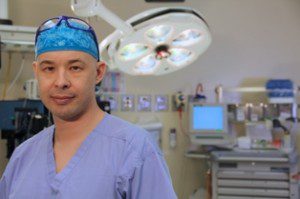
On Monday, a surgical team at Orlando Health will perform the first ever vascularized lymph node transfer (VLNT) in the state of Florida. This microsurgical procedure transfers lymph nodes from one area of the body to another that is affected by a blockage in the lymphatic vessels, also called lymphedema. The surgery is expected to reduce a patient’s symptoms such as swelling and heaviness and relieve their pain and discomfort which will allow them to use their arms and legs again and resume their daily activities. The surgery will be followed LIVE on Orlando Health’s social media channels including Twitter, Instagram and Facebook.
Jean Hutchinson, a breast cancer patient who developed lymphedema in her right arm following breast surgery and radiation, will be the first person in Florida to undergo the vascularized lymph node transfer. Hutchinson has been living with lymphedema for 18 months, which serves as a daily reminder of her cancer and limits her day-to-day activities. During surgery, the surgeons will transfer lymph nodes from Hutchinson’s abdomen to her arm pit and will reconnect arteries and veins to provide the transferred lymph nodes oxygen and nutrients to survive, thrive and develop new lymphatic tissue.
Dr. Richard Klein, who oversees MD Anderson Cancer Center Orlando’s Plastic and Reconstructive Surgery Center, Dr. Kenneth Lee and Dr. Jeffrey Feiner are bringing VLNT to Orlando Health, which will be the first and only hospital system in the state of Florida to offer the procedure. Drs. Klein, Lee and Feiner are among a handful of surgeons in the country who are currently performing this unrenowned procedure to treat lymphedema.
“We see a good amount of patients suffering from lymphedema and no one had a cure other than conservative efforts such as massaging and compressions, so we started aggressively looking for surgical outcomes,” said Dr. Richard Klein, plastic and reconstructive surgeon, Orlando Health. “This procedure has the potential to change the lives of these patients and so many other men, women and children who are affected by lymphedema who until now had very little options for treatment.”
Lymphedema affects 3-4 million adults and children in America and is, unfortunately, not an uncommon side effect of breast cancer treatment in about 15-20 percent of patients, where lymph nodes have been damaged or removed along with breast tissue (mastectomy) in combination with radiation. Other less common cause of lymphedema can include any cancer where lymph nodes have to be removed as part of treatment or diagnosis, trauma to the lymphatic system, infection and congenital disorders. In third-world countries the most common cause is parasitic infection.
Lymphedema prevents lymph fluid from draining from the tissues in the body and, as a result, fluid builds up and causes swelling and soreness to one of the extremities and there is a significant increase in the risk of infection in the affected limb. In many cases, lymphedema causes chronic wounds and ulcers and breakdown of the skin.


